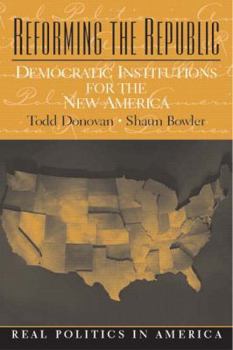Reforming the Republic: Democratic Institutions for the New America
This book offers a general discussion of a wide range of political reforms by addressing how the American political system would be different if various reforms were adopted. Advocating a wide menu of... This description may be from another edition of this product.
Format:Paperback
Language:English
ISBN:0130994553
ISBN13:9780130994554
Release Date:August 2003
Publisher:Prentice Hall
Length:209 Pages
Weight:0.67 lbs.
Dimensions:0.5" x 6.5" x 9.0"
Customer Reviews
1 rating
A guide to moving beyond partisan deadlock
Published by Thriftbooks.com User , 20 years ago
Although this is a serious book written by serious scholars, don't let that scare you away. This slim and readable book is packed with enlightening facts and figures, at the same time that it lays out a simple, compelling, and nonpartisan thesis: that the rules by which we conduct our elections not only shape our elections, but shape our democracy as well. Without offering any quick fixes or easy solutions, Donovan and Bowler convincingly demonstrate that the rules of voting, districting, and holding elections matter, and that the reformation and revitalization of American democracy is as much a matter of electoral reform as it is a matter of policy and politics. The book begins with the perceived problems with the American democratic system: voter dissatisfaction and low voter turn-out, partisan deadlock, increasing polarization of political discussions, a sense of distance and lack of influence on our elected officials, the apparent unresponsiveness of government, the excess influence of special interests via campaign contributions, to name but a few. The authors then discuss the oddities of congressional and presidential elections - not the least of which is the spectacle of the 2000 presidential election in which the winner of the popular vote lost to the winner of the electoral vote. A recurring but unspoken theme of this book is that the old, tried and true ways of doing things - such as one person-one vote, winner-take-all elections - are only one way of doing things and not necessarily the best way. Moreover, the solutions may not be particularly extreme. Let's take one example: Under the current system of electing congress, the person who receives the majority of votes, wins. This seems eminently reasonable, but one consequence is that most people did not actually support the winner. Moreover, the winner can often succeed by playing to a partisan base, ignoring or antagonizing the opposing end of the political spectrum. In other words, the polarization of politics into a two party-deadlock can be seen as a direct consequence of the winner-take-all voting rule. One solution is multi-member districts rather than single member districts, in which the two or three or four highest vote-getters are elected. (Basically, single-member districts could be combined to make a larger, multi-member district; voters would be able to caste votes for more than one candidate.) In this way, most voters would be represented by a person for whom they actually voted. Moreover, moderate candidates are no longer at a disadvantage, but may actually be at an advantage. Politicians know how they are elected, and to whom they are beholden for their election, and they act accordingly. Thus, another consequence of electoral reform is a change in the behavior of politicians after they are elected, as well as before. If they know that they were not elected primarily on the basis of a partisan "base," then they would not feel compelled to play to thi





